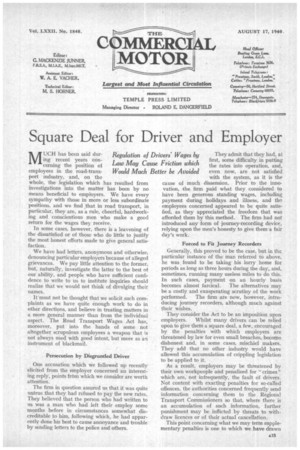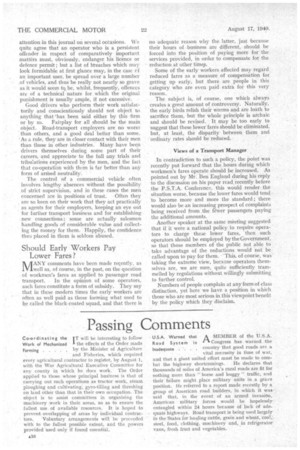Square Deal for Driver and Employer
Page 17

Page 18

If you've noticed an error in this article please click here to report it so we can fix it.
MUCH has been said during recent years concerning the position of employees in the road-transport industry, and, on the whole, the legislation which has resulted from investigations into the matter has been by no means beneficial to employers. We have every sympathy with those in more or less subordinate positions, and we find that in road transport, in particular, they are, as a rule, cheerful, hardworking and conscientious men who make a good return for the wages they receive.
In some cases, however, there is a leavening of the dissatisfied or of those who do little to justify the most honest efforts made to give general satisfaction.
We have had letters, anonymous and otherwise, denouncing particular employers because of alleged grievances. We pay little attention to the former, but, naturally, investigate the latter to the best of our ability, and people who have sufficient confidence to write to us to institute inquiries should realize that we would not think of divulging their names.
It must not be thought that we solicit such complaints as we have quite enough work to do in other directions, and believe in treating matters in a more general manner than from the individual aspect. The Road Transport Wages Act has, moreover, put into the hands of some not altogether scrupulous employees a weapon that is not always used with good intent, but more as an instrument of blackmail.
Persecution by Disgruntled Driver One accusation which we followed up recently elicited from the employer concerned an interesting reply, points from which we consider are worth attention.
The firm in question assured us that it was quite untrue that they had refused to pay the new rates. They believed that the person who had written to us was a man who had left their employ some months before in circumstances somewhat discreditable to him, following which, he had apparently done his best to cause annoyance and trouble by sending letters to the police and others. They admit that they had, at first, some difficulty in putting the rates into operation, and, even now, are not satisfied with the system, as it is the cause of much dissension. Prior to the innovation, the firm paid what they considered to have been generous standing wages, including payment during holidays and illness, and the employees concerned appeared to be quite satisfied, as they appreciated the freedom that was afforded them by this method. The firm had not introduced any form of journey-recording device, relying upon the men's honesty to give them-a fair day's work.
Forced to Fit Journey Recorders Generally, this proved to be the case, but in the particular instance of the man referred to above, he was found to be taking his lorry home for periods as long as three hours during the day,, and, sometimes, running many useless miles to do this. In such cases, payment on an hourly basis becomes almost farcical. The alternatives may be a costly and exasperating scrutiny of the work performed. The firm are now, however, introducing journey recorders, although much against their wishes.
They consider the Act to be an imposition upon employers. Whilst many drivers can be relied upon to give them a square deal, a few, encouraged by the penalties with which employers are threatened by law for even small breaches, become dishonest and, in some cases, mischief makers. They add that no other industry would have allowed this accumulation of crippling legislation to be applied to it.
As a result, employers may be threatened by their own workpeople and penalized for "crimes" which are, not infrequently, the fault of drivers. Not content with exacting penalties for so-called offences, the authorities concerned frequently send information concerning them to the Regional Transport Commissioners so that, where there is an accumulation of such information, further punishment may be inflicted by threats to with licences or of their actual cancellation.
This point concerning what we may term supplementary penalties is one to which we have drawn attention in this journal on several occasions. We quite agree that an operator who is a persistent offender in respect of comparatively important matters must, obviously, endanger his licence or defence permit ; but a list of bt-eaches which may look formidable at first glance may, in the case of an important user, be spread over a large number of vehicles, and thus be really not nearly so grave as it would seem to, be, whilst, frequently, offences are of a technical nature for, which the original punishment is usually ample, if not excessive.
Good drivers who perform their work satisfactorily and conscientiously should not object to anything that 'has been said either by this firm or by us. Fairplay for all should be the main object. Road-transport employers are no worse than others, and a good deal better than some, • As a rule, they are in closer contact with their men than those in other industries.' Many have been drivers themselves during some part of their careers, and appreciate • to the full any trials and tribulations experienced by the men, and the fact that co-operation with them is far better than any form of arrned neutrality: The control of a commercial vehicle often involves lengthy absences without the possibility of strict supervision, and in these cases the men concerned are in positions of trust. Often they , are so keen on their work that they act practically as agents for their employers, keeping an eye out for further transport business and for establishing . new connections ;• some are actually salesmen handling goods of considerable value and collecting the money for them. Happily, the confidence thus placed in them is seldom abused.
Should Early Workers Pay Lower Fares ?
MANY comments have been made recently, as well as, of course, in the past, on the question of workmen's fares as applied to passenger road transport. In the opinion of some operators, such fares-constitute a form of subsidy. They say that in these modern times the early workers are often as well paid as those forming what used to be called the black-coated squad, and that there is no adequate reason why the latter, just because their hours of business are different, should he forced into the position of paying more for the services provided, in order to compensate for the reduction at other time.
Some of the early workers affected may regard reduced fares as a measure of compensation for getting up early, but there are people in this category who are even paid extra for this very reason, • The subject is, of course, one which always creates a great amount of Controversy. Naturally, the early birds relish their worms and are loath to sacrifice them, but the whole principle is archaic and should be revised. It may be too early to suggest that these lower fares should be eliminated, but, at least, the disparity between them and ordinary rates should be reduced.
Views of a Transport Manager In contradiction to such a policy, the point was recently put forward that the hours during which workmen's fares operate should be increased. As pointed out by Mr., Ben England during his reply to the discussion on his paper read recently before the P.S,T.A. Conference, this would render the situation worse, because the lower fares would tend to become more and more the standard ; there would also be an increasing prospect of complaints being received from the fewer passengers paying the additional amounts.
Another speaker at the same meeting suggested that if it were a national policy to require operators to charge these lower fares, then such operators 'should be employed by the.Government, so that those members of the public not able to take advantage of the reductions would not be called upon to pay for them. ." This, of course, was taking the extreme view, because operators them'selves are, we are sure, quite sufficiently trammelled by regulations without willingly submitting to further control. • Numbers of people complain at any form of class distinction, yet here we have a position in which those who are most serious in this viewpoint benefit by the policy which they disclaim.




























































